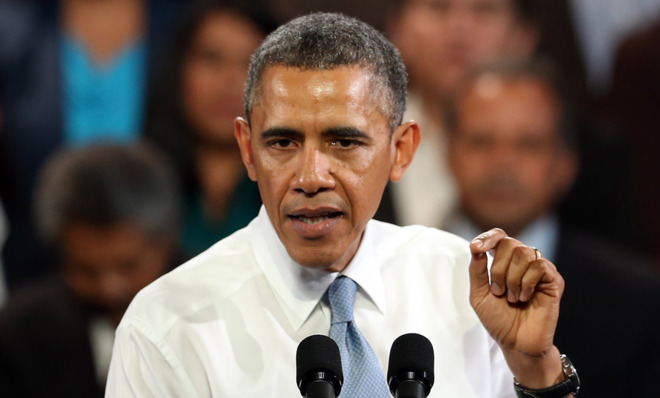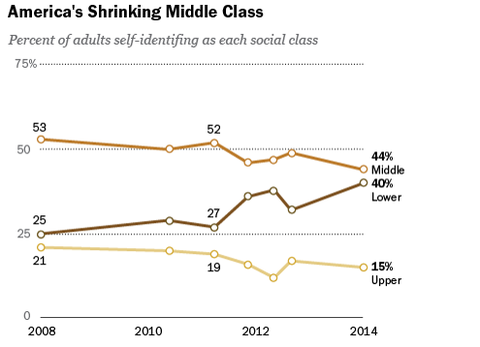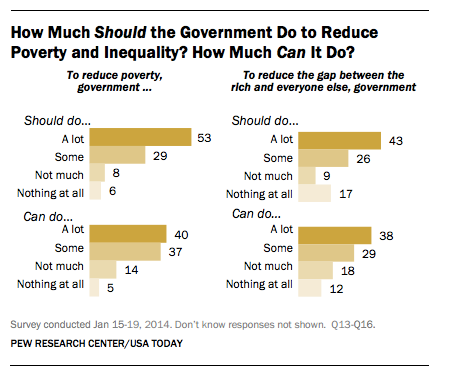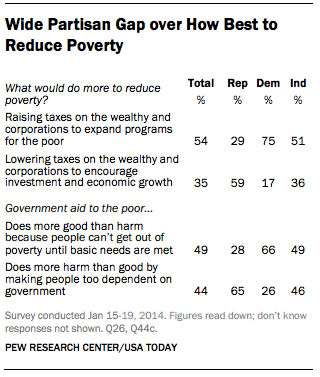The middle class is shrinking, the lower class is growing, and Washington is MIA
These economic problems needn't be intractable. And yet...

A free daily email with the biggest news stories of the day – and the best features from TheWeek.com
You are now subscribed
Your newsletter sign-up was successful
Since the financial crisis in 2008, the richest one percent of Americans have enjoyed a recovery, buoyed by soaring stock prices and rising corporate profits. Meanwhile, the bulk of Americans have seen their wages stagnate.
The result: People are assessing their social standing in a worse light than they once did. Based on the self-assessments of Americans, the middle class has shrunk since 2008, while the lower class has dramatically grown:

[Pew]
The Week
Escape your echo chamber. Get the facts behind the news, plus analysis from multiple perspectives.

Sign up for The Week's Free Newsletters
From our morning news briefing to a weekly Good News Newsletter, get the best of The Week delivered directly to your inbox.
From our morning news briefing to a weekly Good News Newsletter, get the best of The Week delivered directly to your inbox.
A strong middle class has been America's engine of growth for most of the last 50 or 60 years. That's what makes the above chart so scary.
Of course, this may just be a temporary phenomenon. A real recovery with stronger wage growth would push more of those who feel as though they've fallen into the lower class back into the middle class.
But six years is a long time for a temporary phenomenon to persist and worsen. Every year that passes suggest that the trend lines above aren't just some temporary aberration. After enough time, it just becomes the norm.
So what to do? Well, a majority of Americans want government to step in to reduce poverty:
A free daily email with the biggest news stories of the day – and the best features from TheWeek.com

[Pew]
Further, a majority of Americans want to see higher taxes on the rich and corporations in order to spend more on assisting the poor.

Of course, the House is controlled by Republicans, and the White House and Senate are controlled by Democrats. They do not tend to agree on much, to put it mildly.
And yet... there are a few programs to help the newly expanded lower class that might be able to fly with both parties. These include increasing and extending tax breaks for businesses that hire new workers, the streamlining of costly regulations on small businesses, extra spending on improving the nation's infrastructure, and raising the minimum wage (surprisingly, yes, Republican voters do favor it).
Compromise is difficult. But when the middle class is literally falling to pieces, both sides have an urgent reason to act.
John Aziz is the economics and business correspondent at TheWeek.com. He is also an associate editor at Pieria.co.uk. Previously his work has appeared on Business Insider, Zero Hedge, and Noahpinion.
-
 Trump’s fuel blockade puts Cuba in crisis mode
Trump’s fuel blockade puts Cuba in crisis modeIN THE SPOTLIGHT Plummeting tourism, scrambling airlines and rolling blackouts are pushing Cuban society to the brink
-
 ‘The mark’s significance is psychological, if that’
‘The mark’s significance is psychological, if that’Instant Opinion Opinion, comment and editorials of the day
-
 How did ‘wine moms’ become the face of anti-ICE protests?
How did ‘wine moms’ become the face of anti-ICE protests?Today’s Big Question Women lead the resistance to Trump’s deportations